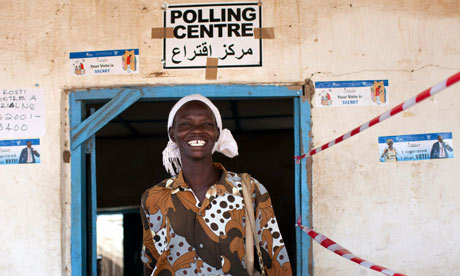The stability of the region depends on Britain's continued involvement in the fragile future of Sudan after the referendum
By Louise Roland-Gosselin
This comment was published in The Guardian on 12/01/2011

On Sunday morning a small polling centre opened in London's Methodist Central Hall, and all this week southern Sudanese throughout Europe have filed in, often dancing and singing, and cast their ballots to determine whether their home country thousands of miles away will split into two. Many of their neighbours here would not be able to pick out Sudan on a map; media and political attention is already drifting as William Hague casually says: "I think we've done everything we can," but in fact we in the UK have an urgent duty to what could soon be the world's two newest countries.
The decades-long and often bloody divorce between the north and south may seem to be a problem just for Africa, or for celebrity campaigner George Clooney, but the UK is intertwined with Sudan's tragic past and present and we cannot wash our hands of its fragile future. As a colony, the British empire drew up the borders of a territory that lumped together the mainly Muslim north and the mainly Christian south. The UK, as part of the "troika" with the US and Norway, led the negotiations that brokered the comprehensive peace agreement in 2005, which stemmed decades of civil war and set the timetable for this referendum. We have spent heavily on humanitarian and governance aid to Sudan, £160m and rising in the last year, and by making it the priority for our presidency of the UN security council we staked our diplomatic reputation on the "success" of this week's referendum.
However, success must be measured in the long term, not merely by a lack of bloodshed in January, and it is critical the UK does not treat the referendum as the end of our involvement. It is predicted that there will be an overwhelming "yes" vote for secession, but after the split, then what? We will be left with a rump north Sudan, which still has as its president Omar al-Bashir, dictator for two decades and indicted for genocide in Darfur, where recent air strikes have demonstrated what happens when international attention wanders. Then the south has a poverty rate of 90%, less paved road than a small English town for an area the size of France, and their only valuable export, oil, depends on pipelines running through their former enemies in the north. It will likely become overnight the poorest country in the world.
This is very much the UK's concern because, despite Hague's comments on Sunday, we haven't "done everything we can" in Sudan recently. Last October, Waging Peace uncovered that the Foreign Office was courting Bashir's regime for trade and oil opportunities, and in November I saw the UK's de-facto south Sudan embassy open. China has often protected Bashir but is now shrewdly establishing a relationship with the south, so if we want our economy and the Sudanese people to gain from trade links, then we also have to get more involved diplomatically. The UK had responsibility for border demarcation, but we haven't done enough to pre-empt potential flashpoints like the oil-rich border region of Abyei, which lies undecided between north and south and has seen further violence this week. Britain's assignment under the comprehensive peace agreement runs out this summer, with a worrying lack of commitment from Hague as to the nature and level of the UK's engagement with north and south Sudan as they develop as independent countries – something the stability of the whole region depends on.
That question of commitment poses the new government's biggest foreign policy test yet. If the UK doesn't want to have wasted hundreds of millions of pounds, if we want the benefits of trade and oil and, most critically, if we want to avoid creating one theocratic dictatorship and one failed state in the world's most dangerous region, we have to fulfil our responsibilities beyond this summer's potential independence day.
No comments:
Post a Comment